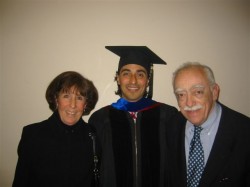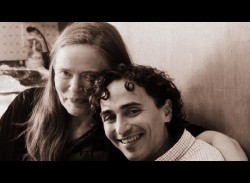Dimitri Topitzes
A Greek orphan brought to Milwaukee, this UWM professor studies how children can be permanently harmed.
James Dimitri William Topitzes was born in 1966, in a small town (Koroni) on the southern tip of the Peloponnesian peninsula in Greece. Soon after his birth he was placed in an orphanage in the city of Kalamata, famous for its olives. Six months later, he was adopted by first generation Greek-Americans, and brought to Milwaukee to be raised in the Sherman Park neighborhood.
Magdalene, his mom, taught in Milwaukee Public Schools for 30 years, and Dimitri attended MPS through the 6th grade and completed middle and high school at the University School of Milwaukee. There, he had some pretty swell friends: for example, his varsity football and baseball teammate Lane MacDonald went on to become a U.S. Olympiad and United States Hockey Hall of Fame Inductee. And he had some interesting relatives as well, for example, his great uncle, Agamemnon Vaselios (Memo) Topitzes, who died last year at age 90. Sometimes called the “Mayor of Walker’s Point, “Memo” was both a neighborhood activist and a National Avenue seller of penny candy.
The Annunciation Greek Orthodox Church on 92nd and Congress, and the Greek community were prominent in James Topitzes’ upbringing. He was accepted by Harvard and initially declared history as his major, but after returning home in the summer of his freshman year, he devoured books about the “life of the mind,” influenced perhaps, by his father, William Topitzes, who ran a small book selling company prior to his retirement a few years ago. Thomas Merton and Robert Lifton, Rollo May and William James, Aldous Huxley and Ernest Becker, the young collegian read them all and upon returning to Harvard signed up for a psychology class.
The die was cast. Topitzes graduated cum laude with a BA in Psychology in 1988.
But he certainly wasn’t a nerd who studied his navel at the expense of a life actually lived. During his Harvard days, he played junior varsity basketball with a friend, Clay Tarver, who asked him if he wanted to form a band with another squad member. “I was a hack drummer at the time and foolishly declined his offer,” he says. “I sometimes think what might have been.” Clay went on to become a relatively well-known indie rock (both hard and punk) guitarist.
Next on this long educational journey came work on his Ph.D in Social Welfare at UW-Madison, which he completed in 2006. Meanwhile, he had been hired as a clinical social worker at Waukesha County’s Department of Health and Human Services, where he worked for seven years both before and after earning his doctorate. His Ph.D. dissertation addressed “The effects of child maltreatment on adult criminality.”
In 2008, he became an Assistant Professor at Helen Bader School of Social Welfare at UW-Milwaukee; and has since added the title of Affiliated Scientist at their Center for Addiction and Behavioral Health Research.
He serves on the Wisconsin Governor’s Child Abuse and Neglect Prevention Board and has won fellowships and funding from the U.S. Department of Health and Human Services and the National Institutes of Health. He has risen far from his childhood in a Greek orphanage.
Topitzes has completed research and written prolifically for various journals on the maltreatment and abuse of youth, and the links between maltreatment and violent behavior and even cigarette smoking by adults. Much of his emphasis is on environmental factors. But are there also genetic factors in “good” and “bad” behavior? we asked him.
“The issue of cultural differences in the judgment of good or bad is very sticky,” he says. He believes it’s possible to strike a reasonable middle ground by striving to tolerate, accept and celebrate cultural differences that may affect a child’s upbringing. “Who is the ultimate judge of” the right way to facilitate a child’s development, he asks, noting that one culture’s common practice can be another’s abusive or nearly abusive practice.
He feels people with mental illness need more access to mental health care because if left untreated, it can lead to child abuse and neglect and violent crime. He also believes corporal punishment of children is a link to pervasive shame in children and hurts them developmentally. “Firm but warm” parenting, no matter what cultural stripe it takes, is best for children, he believes.
Topitzes himself has no children but says that he and spouse Debbie Davis “love our nieces and nephews, though, and all children, for that matter.” They live near Gordon Park in Riverwest.
Along with hiking, biking and swimming, Topitzes’ interests include meditation, a tool he deems useful in prison populations, and also in elementary classrooms. He notes that the Madison Public Schools have been implementing non-sectarian meditation into elementary schools, and it’s been done with some success in California. Meditation was part of his long philosophical journey, and Topitzes believes it could help bring a better future for both children and adults.
City People
-
New Public Allies Leader Comes Full Circle
 Nov 2nd, 2021 by Sam Woods
Nov 2nd, 2021 by Sam Woods
-
Dr. Lester Carter, a Community Anchor for 47 Years
 Jul 2nd, 2021 by Damia S. Causey
Jul 2nd, 2021 by Damia S. Causey
-
Reuben Harpole Found His Purpose
 May 13th, 2021 by PrincessSafiya Byers
May 13th, 2021 by PrincessSafiya Byers





















